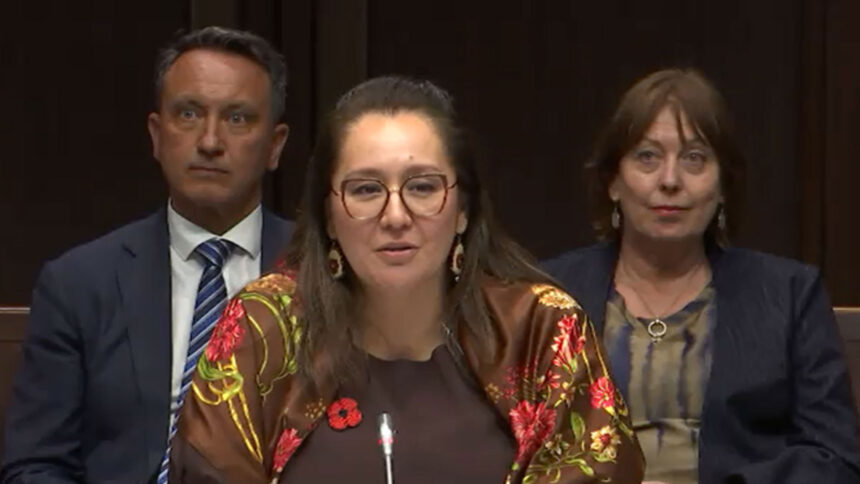Indigenous Services Minister Mandy Gull-Masty clashed with members of the Senate’s Indigenous affairs committee over an amendment to end the Indian Act’s second-generation cut-off. During Wednesday’s hearing, Gull-Masty suggested that efforts to amend her department’s Bill S-2 amounted to racism — even as she was being questioned by a room that included a number of Indigenous senators. “ I know that there is a strong desire to have a solution, but I will first and foremost uphold my responsibility as a minister and address duty to consult, because unfortunately, I may not be kind in my remark, but trying to predetermine a solution for somebody for a group if you do not live with the reality of that issue is racism itself,” Gully-Masty said in an exchange with Sen. Kim Pate. “And I will not uphold that as a minister.” In its current form, S-2 would restore status to roughly 3,500 to 6,200 people who once had legal status but lost it under the Indian Act. The bill addresses the lawsuit Nicholas v. Canada. In that case, a Charter challenge was launched saying that the Indian Act excludes First Nations people from status if their ancestors gave it up through enfranchisement. The Supreme Court of British Columbia gave Parliament until April 2026 to amend the law. But the Senate wants the government to deal with the second-generation cutoff – or at the very least – bring in measures to temporarily fix the problem until it can be settled legislatively. Currently, blood quantum rules strip status after two successive generations marry non-status individuals. It also cuts individuals off from access to treaty rights. But Gull-Masty said it wasn’t going to happen. And in another exchange with Cree Sen. Mary Jane McCallum, Gull-Masty repeated the allegation of racism. “ In the seats that we fill, me as a representative of the Crown, you as an individual and Senate, do not have the authority to speak for rights holders in your decision making as part of these institutes of government that lays with community, that lays with rights holders,” Gull-Masty said. The minister was appearing for the second time to defend the bill — an unusual move. She acknowledged as much in her opening remarks. “I don’t think it is a normal process for somebody to come multiple times to witness in committee,” Gull-Masty said, “but I’m not your normal, average minister.” Throughout the hour-long discussion, Gull-Masty repeatedly urged the Senate not to make amendments that would deal with the second-generation cutoff. The minister told the committee repeatedly that she was planning to lead consultations with First Nations leaders in the future on the problem. “ You and I both served our people, you and I. I probably both ask this government to respect the rights of consultation” Gull-Masty said in an exchange with Mi’kmaw Sen. Brian Francis, a former chief of Abegweit First Nation. But Francis wasn’t backing down. “ I would say we’ve been consulted since 1985. Consultation has been going on for years and years and years, and we have court decisions and court challenges,” said Francis. “ Going back to being a former chief and what my people have gone through, with the second generation cutoff and all the intergenerational trauma that existed from that, let’s get this right and let’s do it now.” Senate heard from more than 60 witnesses Gull-Masty was undeterred. But each time she tried to get the Senate to discuss S-2, senators veered back to the second-generation cutoff issue. Since hearings began on the bill, they heard from more than 60 witnesses — most calling for an amendment to eliminate the second-generation cutoff and allow legal status to be passed from parent to child without end. That includes the Assembly of First Nations, the Indigenous Bar Association, the Union of BC Indian Chiefs and a number of regional chiefs, Indigenous women’s groups and private individuals. “The Assembly of First Nations endorses legislative amendments to the Indian Act that repeal the second-generation cut-off rule and introduce a system whereby an individual who is a direct descendant of a status Indian or an individual entitled to be registered as a status Indian or would be eligible to obtain status,” National Chief Cindy Woodhouse Nepinak told the committee during her testimony on Oct.1. Chiefs passed a resolution to that effect in 2010. The Union of BC Indian Chiefs submitted a brief that reminded the Senate that they also passed a resolution on the matter. “Our position has been unwavering: the second-generation cut-off must be removed from the Indian Act and a return to the pre-1985 one-parent rule must be applied equally to men and to women to prevent legislated extinction,” said the brief. Sharon McIvor, a long time advocate who fought and won a court case that restored status to hundreds of thousands of people in 2009, told the Senate that the second-generation cut off is “damaging” people’s lives. “Why do it now? The lives of young First Nations women and men are being twisted and damaged by the second-generation cut-off right now,” said McIvor. “They are being governed by an unjust, sexist and racist law, and by a government that says they can wait. The government is using up their lifetime.” Sen. Paul Prosper, the interim chair of the committee on these hearings, told Nation to Nation on Nov. 1 that based on testimony he has heard, he plans to introduce an amendment to establish a “one-parent rule,” meaning that if either parent has status, they can pass legal identity and rights to their child in perpetuity. Minister says consultations won’t begin until 2026, framework still in development In Gull-Masty’s first appearance before the committee back in May, when the Senate first began studying the Bill, the minister told senators she was consulting with 90 Indigenous groups and planned to address the second-generation cutoff. She promised to appear before the Senate in December with a path forward. However, when asked by Senators for progress on consultations, Gull-Masty clarified that her department has not yet begun consultation, because it is still co-developing a framework for how that consultation will happen. The earliest formal events, she said, will begin in 2026. “ We are right now presently engaging First Nations holders organizations for the input on how to address this issue and what is the path ahead, said Gull-Masty. “The duty to consult is not merely a checkbox. It is something as minister that I am required, that I will uphold and that I will respect because it is the foundation of a solution for second gen.” She said the department was awaiting submissions from leaders and rights holders that she would receive by December. She noted that any other process would not be legal or meet the duty to consult. “ We are obliged to ensure that the government respects the duty to consult. That message continues in my role as a minister. It is not one that I will change,” said Gull- Masty. Senators question need for more consultation Senators spent much of the evening pointing to a contradiction at the heart of the minister’s testimony. Earlier this year, the Carney government passed Bill C-5, the One Canadian Economy Act — a sweeping overhaul of major project approvals — through Parliament in just two weeks. First Nations leaders were excluded from House committee hearings, and only AFN National Chief Woodhouse Nepinak was allowed to testify before the committee. Nepinak used her time to tell Parliament that she did not believe the process was meeting the legal duty to consult. That bill, critics say, had far more significant implications for Indigenous rights, sovereignty, and land title. Still, it moved quickly — without formal consultation. A number of Senators note that the government seemed to consult only when it suited them. “You look at C-5,” said Francis. “I don’t see any form of reasonable consultation that happened with that.” “ The risk minister is that while we know that your intentions are good, history shows us that the government of Canada uses consultation to perpetuate discrimination and only makes small, narrow fixes when compelled by the courts,” he said. And I know that for a fact, being a former chief.” “ I’ve heard the same commitments, I’ve heard the same promises and then I’ve seen people shuffled out of the position. I also saw what happened with C-5,” said Pate. “You’ve talked about the duty to consult, and I agree. We also have a duty to end the discrimination. Particularly, both the race and the gender discrimination. And so that’s the legislative duty you have, as well as the minister on behalf of the Crown.” Read More: Senator proposes major amendments to end second-generation cutoff ‘It’s really, really serious’: ISC minister grilled by Senate committee on 2nd-generation cut-off in Indian Act Sen. Marilou McPhedran, who is not Indigenous, ended the hearing with a pointed question. Does the minister acknowledge that the second-generation cutoff perpetuates pre-existing sex discrimination? And if so, ”what justification can you and Canada offer for forcing these women and their descendants, whose rights are being violated now, to wait longer after 40 years?” she asked. Gull-Masty said yes, but then made a series of pointed statements, “ You yourself have not lived the reality as an Indigenous woman,” Gull-Masty quipped, adding that based on previous conversations, she did not believe McPhedran understood the term “rights holder.” McPhedran shot back, “You are misquoting me, significantly.” “I’m not,” replied Gull Masty. “ And it was a private meeting that we had and you are misinterpreting and misrepresenting what I said,” said McPhedran. The honour of the Crown Prosper, who is a Mi’kmaw senator from Nova Scotia and a former regional chief of the AFN, intervened to bring the exchange back to order. “ Consultation – there are many derivatives of it – but foremost is the honour of the Crown that is at stake here when we’re talking about consultation,” he said. “ These witnesses talk about history, they talk about reports, they talk about the second generation cutoff, and it almost seems like it’s being viewed in a vacuum of we have to go to community, that’s the only mechanism when all this work has been done before. “So where is the value of that work and does that not warrant the government to act honourably?” he asked the minister. Gull-Masty replied that her approach to the second generation cut off “will be based on solutions that come from the community because I will uphold the duty to consult not just because it is my legal duty, but because it is morally the right thing to do.” She reminded the Senate that the purpose of S-2 is only to deal with a smaller number of individuals who won a court action, and urged them again not to amend the bill. Prosper has previously indicated his plan is to make amendments next week. However, even if those amendments pass, Bill S-2 will proceed to the House of Commons, where the amendments are likely to be undone. Continue Reading
Mandy Gull-Masty calls Senates push to end the second-generation cutoff racism

Leave a Comment










